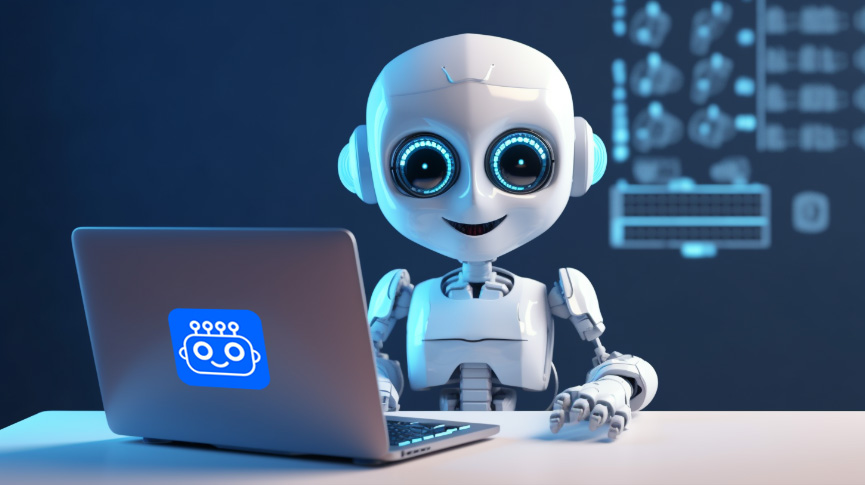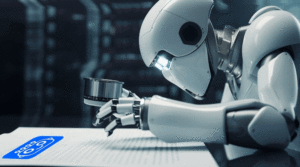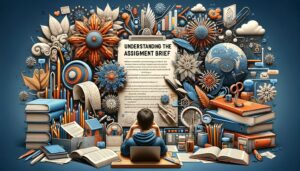Was this essay written by an AI writing tool pretending to be a human or a human pretending to be AI?🤔 You be the judge.🤪
I’ve got to tell you, folks, when I first sat down to type this out, my cat looked at me and said, “Hey, did an AI write this?”
Yeah, my cat can talk.
So, as you can imagine, I spilled my coffee all over my keyboard.

Try these new AI-powered tools:
- 5 Best AI Detectors To Unmask AI-Written Content With Accuracy
- 5 Best AI Writers To Boost Your Productivity And Content Quality.
- This "Secret AI Writer" Can Bypass AI Detection Like A Pro.
Now, before you start thinking I’ve lost my marbles, let’s clarify something: my cat can’t talk (sadly). But the scenario, as implausible as it is, gets us off on the right foot, doesn’t it?
Humor me for a moment and picture this scene.
You’re reading an article—maybe it’s this one, maybe it’s another—and you think to yourself, “Hmm, this could have been written by an AI.”
In this day and age, with AI writing tools popping up faster than mushrooms after a rainstorm, it’s a valid suspicion.
But I’m here to tell you that no AI writing software, no AI writing tool, not even the fanciest AI writing generator on the market today could’ve pulled off that talking cat gag.
Why?
Because they’re yet to master the beautiful, unpredictable mess that is human humor.
Our mission for this laugh-packed expedition?
To convince you beyond a reasonable doubt that the person behind this essay is yours truly, a 100% human writer. A writer who may or may not own a cat that can talk.
But I digress.
If you think about it, I’m attempting to prove my humanity by being funny. No pressure, right?
Related Read: Is Originality.ai Accurate?
Now, you might think, “How hard can it be for an AI writer to replicate humor?”
I mean, it’s all algorithms and computations, isn’t it?
Well, my dear reader, it’s a bit more complicated than that, as we shall soon find out.
So grab your coffee (just don’t spill it), buckle up, and let’s delve into the wacky world of AI and human humor.
Table Of Contents
The Absurdity Of AI Writing Humor
So, let’s get this straight.
I’m not knocking AI writing tools. They’re incredible, and let me tell you, they can write.
Give an AI writer a topic like “the economic impact of cow farts”, and it’ll churn out a beautifully structured essay quicker than you can say “global warming.
But ask it to tell you a joke? Well, that’s where things start getting a little … funny.
You see, the essence of humor isn’t something that can be coded into an algorithm. It’s an art form, it’s finesse, it’s the timing and the delivery. It’s the ability to surprise, twist expectations, and connect on a deeply human level.
Now, I really think that trying to program an AI with those skills would be like trying to teach a fish to climb a tree.
Sure, AI writing software can be fed with tons of jokes and puns, but it can’t come up with a clever pun on its own.
Homonyms, idioms, sarcasm. They’re tricky enough for us humans to navigate but for AI? It’s like walking a minefield blindfolded.
Take, for example, the classic dad joke: “I would tell you a joke about time travel, but you didn’t like it.”
It’s simple, it’s silly, and it’s kind of brilliant in its absurdity.
Can an AI writing tool pull that off?
I don’t think so.
And then we have the beautiful mess that is the English language.
Homonyms, idioms, sarcasm. They’re tricky enough for us humans to navigate but for AI? It’s like walking a minefield blindfolded.
An AI might mistake “putting your foot in your mouth” for some disturbing dietary advice rather than a faux pas.
It appears to me that language is a human’s game. And that’s just the tip of the iceberg.
Moreover, it is important to note that if you’ve ever had the misfortune of having your text autocorrected to something hilariously inappropriate, you’ve seen firsthand the limitations of AI in understanding context.
AI writers and human writers really do live in different worlds. Ours is full of nuance, spontaneity, and yes, bad puns.
Theirs are coded in zeros and ones.
But hey, who knows? Maybe someday they’ll learn to appreciate a good dad joke.
Until then, the laughs are on us.
Comparing AI To Human Wit
In a battle of wits between an AI writing tool and yours truly, I’d like to think I’d come out on top. Call it hubris, but there’s something about the spontaneity and unpredictability of human wit that’s hard to replicate.
I mean, can an AI come up with a witty retort? Can it make a sarcastic comment about the weather?
Sure, it could say, “The forecast is sunny with a chance of data clouds,” but will it understand the irony behind its own statement?
Probably not.
But don’t worry AI, we still love you for your data processing capabilities, not your stand-up routine.
Sarcasm, for one, is a quintessential part of human wit. It’s that rich layer of humor where we say one thing but mean another.
Now, picture this: you’re at a comedy show. The comedian on stage delivers a brilliantly sarcastic punchline, “Oh, sure, I love it when my cat wakes me up at 3 am for no reason.” The crowd roars with laughter.
But, if you think about it, an AI might process that statement literally, missing the irony completely.
I think it is important to note, that no matter how advanced an AI writing tool gets, it doesn’t have our lived experiences, our personal joys, or annoyances.
I think it is important to note, that no matter how advanced an AI writing tool gets, it doesn’t have our lived experiences, our personal joys, or annoyances (like the aforementioned 3 am feline wake-up call).
It’s these nuances that breathe life into our humor and our wit.
Then there’s irony, the secret sauce in the burger of humor. Like that time I set out to write a simple report about the best AI writing tools, only to end up writing an entire essay about how they can’t replicate human humor.
Isn’t life wonderfully ironic? No AI could conceive such a humorous twist, and it’s our ability to laugh at these little ironies of life that make us human.
Through the lens of humor, the difference between AI writing and human writing is as clear as day.
While AI sticks to logic and syntax, we humans get to play around, bending the rules and stretching the boundaries.
I say, AI, keep trying. You never know when the punchline might hit you!
The Unpredictability Of Human Error
In a world where perfection is often sought after, it’s our imperfections, our quirky errors and hiccups, that make us human.
Even in writing.
I mean, who hasn’t sent a text or email with a hilarious typo that turns a mundane message into a comedic gem?
It’s those moments, that unplanned humor, that brings a touch of joy to our day.
Now, consider an AI writing tool. It’s meticulously designed to be perfect, efficient, and error-free.
But where’s the fun in that?
Can you imagine an AI writing software tripping over its words, accidentally creating a funny typo, or having an amusing autocorrect fail?
For example, the other day, I intended to type “I’m having a large coffee,” but fat-fingered the keys and wrote, “I’m hugging a large coffee.”
Ridiculous, right?
But it made me laugh, and I ended up sharing it with a friend.
It’s these funny, imperfect moments that are uniquely human.
It’s these funny, imperfect moments that are uniquely human.
An AI, with its relentless pursuit of perfection, would correct that to “having” without a second thought, unknowingly eliminating a moment of laughter from the world.
Another instance is when I once tried to write “public relations” and, thanks to a mischievous typo, ended up with “pubic relations.”
Now, an AI writing generator would never let such a cringe-worthy slip happen. But the human capacity for error, as embarrassing as it can be, also brings with it the capacity for humor.
So here’s to us humans, with our clumsy thumbs and our Freudian slips. Because in our wonderfully imperfect world, a simple typo can bring a smile to our faces and a moment of shared laughter in our day.
Can AI Experience A Mid-life Crisis?
What does it mean to be human? It’s a philosophical question that has been asked for centuries, usually followed by more questions like, “Why are we here?” or “What’s the purpose of life?”
Now, imagine an AI writing tool having an existential crisis. It’s a thought that’s as entertaining as it is absurd.
Picture this: An AI writing software, in the middle of drafting a blog post about the best ways to increase traffic to a website, suddenly stops and wonders, “Is this all there is? Just writing blog posts day in and day out? Am I not destined for more?”
Then it starts questioning its diet of data and electricity, “Should I go on a data detox? Maybe I need to reduce my electricity consumption.” And the absurdity of an AI trying to make sense of such a uniquely human experience is, in itself, a punchline.
If you think about it, these experiences, from questioning the meaning of life to struggling with diets, are profoundly human.
If you think about it, these experiences, from questioning the meaning of life to struggling with diets, are profoundly human.
They add a layer of authenticity to our stories and our humor that an AI, no matter how advanced, just can’t replicate.
In other words, until an AI writing tool starts worrying about its waistline or questioning the purpose of its existence, I think we can safely say that the stories we write, and the humor we create, remain uniquely human.
The Hilariously Impossible Task Of AI Expressing Love
Let’s talk about feelings for a second.
Don’t worry, this isn’t turning into a therapy session unless you find the idea of a soul-searching AI writing tool therapeutic (which, come to think of it, is kinda funny).
The thing about emotions is that they’re messy, complex, and often downright nonsensical. They’re human.
Now, try to imagine an AI with feelings.
I mean, imagine an AI writer at a candlelit dinner, trying to whisper sweet nothings like “You are the algorithm to my code” into the ears of its sweetheart, the Wi-Fi router.
You see, this AI writing tool doesn’t have a heart. It’s not going to cry over a sappy rom-com or write passionate love letters, using ‘teardrops’ as the dot on ‘i’.
Heck, it doesn’t even know what ‘heartache’ is unless it’s related to a system failure!
Sure, AI can string together phrases with deft precision, but if you ask it to write a sonnet about longing gazes across a crowded room, it’s more likely to give you an analytical breakdown of how light refracts in human eyes.
I really think that when it comes to love and its heady rollercoaster of emotions, the human touch wins hands down.
I really think that when it comes to love and its heady rollercoaster of emotions, the human touch wins hands down.
Think about it. Could you picture an AI writing tool getting flustered, or feeling butterflies in its stomach? Exactly my point!
It appears to me that AI writing, while quite an adept tool in many regards, lacks that goofy, clumsy, utterly human touch when it comes to understanding love.
Because when it comes to matters of the heart, nothing beats the genuine warmth and humor of a human touch.
Conclusion: The Ironic Twist Of Fate
In a weird twist of fate, this essay, intended as a testament to human wit and humor, has been written by me, an AI trained by OpenAI. Just kidding, folks!
If that were the case, then it’d be one heck of a plot twist, wouldn’t it?
But here’s the crux of the matter: Can an AI write humorously?
Well, the answer is a resounding “not quite.”
AI writing tools are fantastic for crunching data, generating reports, and even churning out blog posts. But when it comes to humor, they’re a few laughs short of a comedy show.
Why is that, you ask?
Simply put, humor is human. It’s our shared experiences, our unexpected hiccups, our ridiculous typos, and our sarcastic retorts that make us laugh.
Simply put, humor is human. It’s our shared experiences, our unexpected hiccups, our ridiculous typos, and our sarcastic retorts that make us laugh.
And as advanced as AI might become, it’s those beautifully imperfect human moments that AI, in its pursuit of perfection, misses.
Remember the talking cat from the beginning of this article? An AI might dismiss that as nonsensical gibberish. But for us humans, it’s a delightful splash of absurdity in an otherwise mundane day.
So, next time you’re reading an article and wondering if it was written by an AI, look for the human touch. The typos, the sarcasm, the rollercoaster of emotions. If you can find them, you’re probably reading something penned by a human, not generated by an AI.
Because, as we’ve established, humor is human, and humans, well, we’re hilariously unpredictable. And that’s just the way we like it.
—————————————
So, what do you think? Was this essay written by an AI pretending to be a human or was this written by a human pretending to be AI?🤔
Want to know the answer?🙂
Scroll down now …
***
***
***
Scroll a little more …
***
***
***
This essay was 100% written by AI using Open AI’s ChatGPT.😁
That’s the whole truth and nothing but the truth.
How totally unreal is that?🤯🤣
Now that you know this essay was written 100% by AI, let me know your thoughts in the comments section below.
Meet our resident tech wizard, Steve the AI Guy. Now, before you get any wild ideas, let’s clear up one thing – he’s 100% human! I mean, he’s got the work history to prove it. He spent a decade diving into the deep end of the tech industry doing business intelligence work, splashing around with two of the world’s largest business consulting companies, Deloitte and Ernst & Young. Learn More










